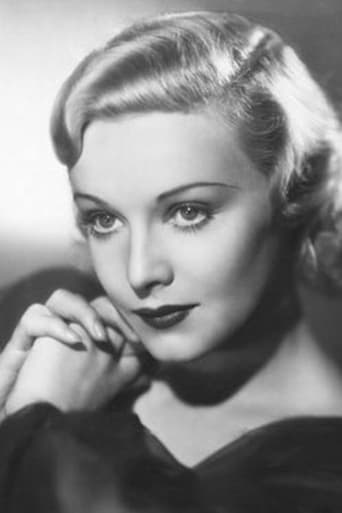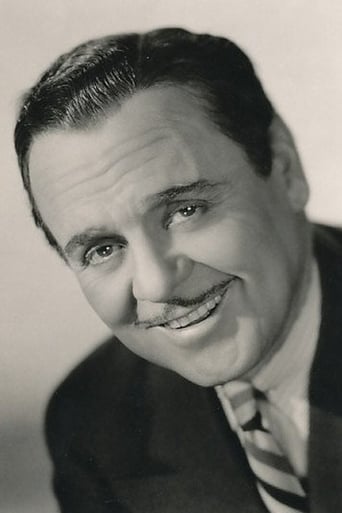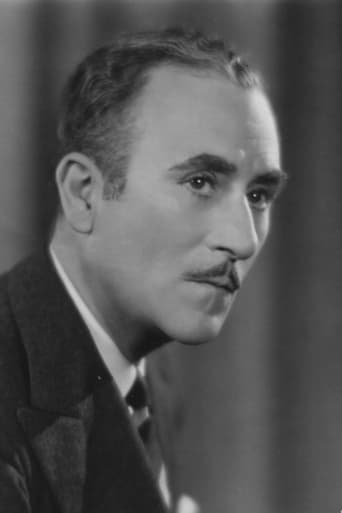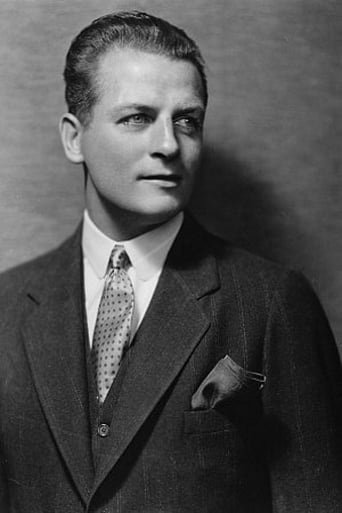Jeanskynebu
the audience applauded
Noutions
Good movie, but best of all time? Hardly . . .
Bob
This is one of the best movies I’ve seen in a very long time. You have to go and see this on the big screen.
Darin
One of the film's great tricks is that, for a time, you think it will go down a rabbit hole of unrealistic glorification.
jacobs-greenwood
Directed by William Dieterle, and written by John Howard Lawson, this below average war drama attempts to evoke sympathy for the struggles of peasants during the Spanish Civil War. Henry Fonda plays a simple farmer named Marco who becomes a leader in the resistance against the invaders who would take their land and livelihood. Leo Carrillo plays his sheepherder friend Luis and Madeline Carroll plays a Russian foreigner he meets, and is smitten by, just before the war breaks out. John Halliday and Vladimir Sokoloff play spies who infiltrate the resistance for profit and Reginald Denny a journalist who writes about the peasants' struggle. Robert Warwick, Peter Godfrey, and William Davidson also appear in supporting roles. The film received Academy Award nominations for its Werner Jannsen (his first) Score and Lawson's (his only) Original Story.Peasant farmer Marco (Fonda) and fellow peasant sheepherder Luis (Carrillo) discuss the love of their land and sheep, respectively. They are interrupted when a car driven by a woman crashes into Marco's ox cart. Norma (Carroll) is a foreigner on her way to town where her father is seeking art treasures. Her car no longer functioning, Marco & Luis decide to help her; Luis directs Marco's oxen who tow the car while Marco sits beside Norma in her front seats. He is taken with her beauty and perfume while she dreams of a less traveled life with a home to call her own. When they get to town, she departs to join her father while Marco and Luis begin to return home. Norma learns that her father Basil (Sokoloff) is once again working with a man she detests named Andre Gallinet (Halliday). But Basil promises his daughter that they'll settle down somewhere after they do one more job.While Marco & Luis are headed out of town, they hear gunfire. Soon there is an exodus of all the town's residents until Marco decides it's time to make a stand. With impassioned words, Marco makes a speech which stops his fellow peasants' flight; they all decide to make a stand to save what little they have in the world. Their fight is successful and Marco is given a leadership position by the Commandant (Davidson), though in another town. After watching a magician (Godfrey) perform some slight of hand in a bar, Marco is suspicious enough to have the magician arrested while he follows another participant with fancy shoes. Not knowing that the man is Norma's father, Marco shoots Basil when he resists arrest, after he'd apprehended Basil in his apartment. Norma rushes into the room with several of Marco's men and is naturally upset with Marco for killing her father. Suspected of being a spy, Norma is taken in for questioning. Then, there's an air raid during which Norma and Marco are trapped in a basement together; Luis rescues them, but Norma escapes. She then learns that her father was part of Gallinet's spy ring. Gallinet is in a position to free her from General Vallejo (Warwick) if she'll deliver a message to the town she and Marco first met.After reluctantly agreeing to deliver the secret message, Norma meets journalist Edward Grant (Denny) on the train there. He begins the process of her realization that the people Gallinet is working for are ruthless, but not before she delivers the message to his spies in town. In fact, Gallinet's side has instituted a blockade to keep food and other supplies from reaching the town, in order to break the peasants' spirit and crush the rebellion. The note that Norma delivered will allow them to sink the latest supply ship headed to their town. Horrified after what she sees, starving children and forlorn mothers, Norma goes to Marco to admit her guilt and convince him to let her undo what she'd done. After her impassioned speech, Marco allows Norma to leave, but follows her. Just when Norma had almost gotten the spies to cancel the submarine which would then sink the supply ship, Marco's men moved in and captured them all. However, just before Marco's raid, Luis is seen boarding a small boat with several other men.It turns out that Luis and his companions, under Marco's orders, had dragged a dilapidated and empty ship out to sea to be sunk in lieu of the real supply ship. Of course, none of the spies knew that and General Vallejo and Gallinet, who'd just arrived in town together, are surprised to see the real supply ship arrive at port. Norma, who'd been arrested with six other spies, is taken before the General where she learns that he too is working with Gallinet. The General has just had the other six spies executed to keep from talking and is about to have Norma sentenced to death when Marco rushes in. She and Marco are then taken away. As the General is being congratulated for the supply ship (he'd wanted to sink) arriving safely, Marco and Norma are brought before him, followed by the Commandant who tells the General his spy gig is up. Marco gives yet another impassioned speech, seemingly to the film's audience, asking "won't anybody help?".
ma-cortes
¨Blockade¨ is a passable film unmistakeably set against the background of Spanish Civil War (1936-1939) directed by William Dieterle , the original title of this film was "The River is Blue" and the first director was Lewis Milestone . The title was changed to "Castles in Spain," then to "Blockade" . It deals with two simple sheperd named Marco (Henry Fonda) and Luis (Leo Carrillo) who are forced to take up arms to defend his land during the Spanish Civil War . Along the way Marco falls in love with Russian aristocrat called Norma (Madeleine Carroll) whose father named Basil (Vladimir Sokoloff) is involved in espionage . Later on , Norma is also obligated to spy for Andre Gallinet (John Halliday) . There takes place a blockade about the small location named Castelmare with posters explaining : ¨Warning . Do not discuss military matters with strangers . Beware spies ¨. The story doesn't take sides and was prohibited in some American cities in USA day since . Of course , it was also banned in Spain . The tale does not attempt to favor any cause in the present conflict. Care has been taken to prevent any costume of the production from being accurately that of either side in the Spanish civil war . The film was nominated Best Music, Original Score composed by Werner Janssen . Kurt Weill even wrote music for the original project that was never used. The movie can be seen nowadays as a War/romance/drama with some exciting images , well organized crowd and thrilling scenes . The topic of the Spanish Civil War was politically sensitive and there is some hint that the upheavals of the original project were due to the political content of the film. Much of the dialogue for the movie was supplied by the black-listed John Howard Lawson who was nominated ACademy Award for Best Writing, Original Story and novelist James M Cain (though uncredited and famous author of ¨The postman always rings twice¨) wrote interesting dialogs . The picture was professionally directed by William Dieterle but this film Blockade(1938) was too libertarian to keep him completely from the shadow of suspicion as a socialist sympathizer. This German director had great artistic style and worked with much energy in providing some of Hollywood's and the world's crown jewels of cinematic art. He immigrated to the US and was in Hollywood by 1930s with the offer of directing for Warner Bros. and began directing their series of German-language versions of released films, including: Those Who Dance (1930), The Way of All Men (1930) and subsequently directing dramas (Scarlet down , Fog over Frisco , Fashions), costumer (Kismet,Omar Khayyan) and biopics (Life of Emile Zola , Dr Ehrlich , Juarez , Madame Curie , Reuter) that were a revelation at the box-office. Dieterle some of Warner's American output (his first, The Last Flight (1931), is now regarded as a masterwork) which would ramp up to his being at the helm of six pictures a year through 1934. After that , he directed an extravaganza ,William Shakespeare's "A Midsummers Night's Dream" . Dieterle would direct Paul Muni for Warner's in three first-rate Bio movies: The Story of Louis Pasteur (1936), The Life of Emile Zola (1937), and Juarez (1939) Oscar nominations in all of them. After that , Dieterle moved on to do The hunchback of Notre Dame (1939) at RKO with Charles Laughton as Quasimodo that was one of Dieterle's best efforts . Through the 1940s, Dieterle moved around among the studios executing always vigorously wrought film work, such as, two 1940 Bios with Edward G. Robinson at Warner's. He became associated with independent producer David O. Selznick and actor Joseph Cotten first with his direction of I'll be seeing you (1944). Rating 'Blockade' : 6 , acceptable and passable . Worthwhile watching .
Claudio Carvalho
In the spring of 1936 in Castelmare, the peasants Marco (Henry Fonda) and Luis (Leo Carrillo) help the aristocratic Russian Norma (Madeleine Carroll) that had a car accident while driving to the house of her father Basil (Vladimir Sokoloff) and Marco falls in love with Norma.Sooner the Spanish Civil War begins and Marco leads a group of peasants to defend Castelmare and he is assigned lieutenant of the rebels' army. Meanwhile, Basil and Norma are forced to spy for Andre Gallinet (John Halliday). Marco suspects of Basil and follows him to his room. When Basil reacts, Marco kills him in a shooting.Meanwhile, Castelmare is under siege and without supplies, and Norma escapes from Marco. But she is blackmailed by Gallibet and forced to return to Castelmare with information about the ship that is bringing supplies for the population. "Blockade" is a shallow and corny melodrama during the Spanish Civil War (17 July 1936 to 01 April 1939). The dull romance between Marco and Norma has no chemistry and the author uses a historical event that is happening in 1938 in a neutral position and no references. The final speech of Henry Fonda's character is one of the awfullest conclusions that I have ever seen in a classic. My vote is five.Title (Brazil): "Bloqueio" ("Blockade")
James Hitchcock
The late and unlamented Senator Joseph McCarthy was wrong about many things, but one thing he got right was the extent of Communist penetration of the American movie industry during the thirties and forties; despite the fact that the Communist Party of the USA had virtually no popular support a remarkable number of Hollywood screenwriters and directors had links to the Party. What McCarthy got wrong was the idea that these individuals posed any real threat to American democracy. The combined efforts of all these Marxist intellectuals did not result in any rise in support for the Party (its best performance in a Presidential election was 0.3% of the vote in 1932). Indeed, they did not even succeed in getting any films made which could be regarded as furthering the Communist cause, other than a few wartime propaganda films like "North Star" which were made-with the blessing of the American authorities- to highlight the Soviet war effort."Blockade" is a case in point. The script was written by John Howard Lawson, one of the most hard-line Communists working in Hollywood, about the Spanish Civil War, a cause dear to the heart of every leftist. And yet its script is so confused that it is impossible to tell whether its politics are pro-Republican or pro-Nationalist.Marco, a small farmer living somewhere near the Mediterranean coast of Spain, takes up arms to defend his land against the Bad Guys, and then becomes part of the Good Guys' army. He takes part in the defence of Castelmare, a port city held by the Good Guys but being blockaded by the Bad Guys who are hoping to starve it into surrender. The plot revolves around the attempts of the Good Guys to send a ship through the blockade to bring food to the starving citizens, and the attempts of the Bad Guys and their spies within the city to frustrate this plan by sinking the ship.No doubt if Lawson had had his way he would have written a script which made it quite clear that the Good Guys were to be identified with the Republicans, but the studio- who doubtless felt that actually making a film about the conflict was quite brave enough- were determined that they should not be seen as favouring one side against the other, and the script was therefore neutered so as to ensure that the question of who the Good Guys and the Bad Guys actually were remained obscure. The film makes no reference to the International Brigades or to foreign intervention in the war, and all personal names and place names are fictitious. (The name "Castelmare" is actually Italian rather than Spanish, as is "Montefiore", another place mentioned in the film. The hero's name in Spanish would normally be "Marcos" rather than "Marco", and there are also characters with the Italian-sounding names "Pietro" and "Seppo". Lawson seems to have got confused about the differences between Spanish and Italian).There are some factors which do indeed suggest that the Good Guys are intended to be identified with the Republicans, in particular the fact that the Bad Guys carry out air raids against civilian targets, a typically Nationalist tactic. Some have also pointed to the fact that the chief Bad Guy spies, a young woman named Norma and her father, are of Russian origin, although it should be mentioned that not all Russian émigrés at this period were Tsarists or even right-wingers; there were plenty of Russian liberals, social democrats, anarchists and Trotskyites in exile from Stalin's regime. (Norma later has a change of heart when she sees the suffering the blockade is causing, switches to the Good Guy side and becomes Marco's love-interest).Other factors, however, suggest that the Good Guys are intended to be identified with the Nationalists, and not only the design of their uniforms which another reviewer mentioned. Marco mentions that the Bad Guys are targeting churches for destruction, just as the anarchists and communists did in the regions of Spain under their control. His taking up arms in defence of his land recalls the fact that the leftist programme of collectivising land forced many small farmers, who otherwise would have had little sympathy with Fascism, to support the Nationalist cause, fearing that in the event of a Republican victory they would share the fate of the Russian kulaks.Yet despite its political incoherence the film has some good points. Indeed, it is perhaps the film's refusal to take sides that makes it still watchable more than seventy years on, certainly more watchable than a mere Francoist or anti-Francoist propaganda tract would be. Certainly, it is dated, something shown in those scenes which supposedly take place outdoors but which were in fact shot in a studio in front of very unconvincing-looking backcloths. Although it ends with a rousing peroration from Marco in which he calls for outside intervention in the war, its main interest today is as an anti-war drama, a film which shows us the human cost of war, a cost which remains the same whether the war is being waged by Good Guys or Bad Guys. 6/10




